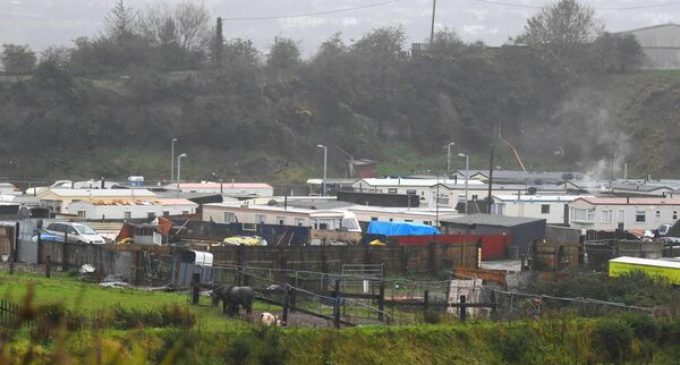Traveller housing scheme planned for next to Cork’s Spring Lane site
Larry Cummins

Funding approval had been obtained from the Department of Housing for a group housing scheme at the adjoining Ellis’s Yard site, council report reveals
A local authority has secured State funding to draft plans for a group Traveller housing scheme next to one of Ireland’s worst Traveller halting sites – a decade after a similar approach was shot down by city councillors – while it works with individual families to identify potential housing solutions.
The fresh efforts to address the many complex and enduring issues on the Spring Lane halting site in Ballyvolane, on the northside of Cork City were outlined to city councillors six months on from a scathing report on the council’s management of the site.
Last May, the Ombudsman for Children’s Office (OCO) found, after three years of investigation, that the council had failed to consider the best interests of children living on the site by allowing them to live in filthy, overcrowded, rat-infested, and unsafe living conditions.
The OCO found the council failed to maintain the site, including the upkeep of the toilet and showering facilities known as “welfare units”, ensuring consistent waste management and pest control, and providing a clear and safe passage to school, as well as areas for children to play.
It found record-keeping was not transparent or accountable, that housing applications were incomplete or not processed, meaning families may have missed out on getting a home or did not move up the list, and that overcrowding on the site was another result of poor administration.
The OCO also found the local authority failed to account for the disadvantages experienced by Travellers in effectively securing accommodation and they did not meet their obligations in relation to the Traveller accommodation programme.
The council rejected the report and said matters were “nowhere near as simple as outlined”.
In a rebuttal report to the Department of Housing, it said the OCO report did not show a “complete understanding or appreciation of the complex problems and deep-rooted socio-economic issues” involved at the site.
Solidarity councillor Fiona Ryan called before Christmas for a full report from council chief executive Ann Doherty on the council’s response to the OCO report, and the issue was discussed at Monday’s council meeting.
The director of services in the housing directorate, Niall Ó Donnabháin, told councillors that addressing the range of issues at the site is taking up a huge amount of time within his department.
“There is no doubt about the fact that it is a challenge – it is a huge challenge across the board, dealing with the day-to-day operational maintenance issues and also on the long-term plans to deal with the provision of longer-term solutions for the 50 families that are existing on Spring Lane,” he said.
It is not an easy challenge. Solutions are required that are based on a family-by-family basis. We have employed the relevant support services in terms of liaison people to engage with the families to understand their needs.”
He said the council was dealing with “significant expectation” from families on the site and that a significant cohort was looking to move to more settled accommodation.
“And that is a challenge because it takes time, it takes understanding, and in a lot of cases it’s a fundamental shift for a lot of these families and what we are doing is understanding that,” he said.
He also said the Peter McVerry Trust would be able to help by providing “wraparound services” to families seeking to relocate into “settled accommodation” so they could be supported in a way that “goes beyond what we would do on a day-to-day basis”.
“We will see progress over the next 12 to 24 months but you can’t magic up solutions like this overnight,” he said.
“The provision of long-term housing solutions and accommodation solutions for these families needs to be done right and correctly from the start.”
Councillors were also presented with a detailed written report on the council’s efforts since May to address the OCO’s recommendations, including details of its six-month review with the OCO in December.
The report said in line with the OCO’s first recommendation, Ms Doherty was overseeing the council’s response and that bi-weekly meetings were taking place with the council’s assistant chief executive to update on progress made.
Funding approval obtained
But, crucially, it revealed that funding approval had been obtained from the Department of Housing for a group housing scheme at the adjoining Ellis’s Yard site and the necessary assessments, surveys and designs to embark on Part 8 planning process.
Council proposals to extend the halting site into this council-owned yard were voted down by city councillors in 2011.
The report also said that on foot of another OCO recommendation, the council also plans to refurbish or redesign the halting site’s original 10 bays for the families that wish to remain, to include welfare units, electrics, water, and sanitary services, in parallel with the delivery of a group housing scheme at Ellis’ Yard.
A project implementation team has been established to help deliver this work, and in the meantime, temporary welfare pods will be provided.
“There have been major difficulties in obtaining such units due to current supply chain delays for construction-related equipment, which are well-documented, but matters are in hand and under control,” the report said.
The report said the council established a team, including external service providers, to prepare and carry out an engagement with the halting site residents to “identify all relevant issues, both social and technical, to identify and implement a sustainable solution to improve the quality of lives of the children and their community, as soon as possible”.
The report said the council was glad its “lead engagement team” had been accepted by the Traveller community, and that following months of family, in-person meetings and phone calls, all in the context of pandemic restrictions, trust was being restored in its relationship with the community of Spring Lane.
The report said engagement has given the council “a clear assessment” of the numbers of households that will accept “standard local authority housing”, it has identified those that wish to remain in a refurbished Spring Lane site, and those that wish to move to the group housing scheme at Ellis’s Yard, or to a group housing scheme elsewhere between now and 2024.
“The city council’s ability to deliver on expectations will, of course, be contingent on availability within existing housing stock, the demands of the growing social housing support waiting list (currently circa 4,500 approved households) and willingness of the residents of Spring Lane to be flexible regarding the type and location of supports they are willing to accept to meet their housing needs,” the report said.
The OCO recommended an immediate review of housing applications made by the 11 Traveller families who made the complaint to the OCO, to identify any potential administrative errors that may have adversely impacted them and their children.
The council report said the council’s internal audit section reviewed the applications and confirmed that all “relevant information and procedures were followed”.
“It is the city council’s opinion that no errors were identified that would have adversely impacted the applicants’ success in bidding for social housing on the Choice Based Letting (CBL) system,” the report said.
However, the audit section did suggest “process improvements” that may help manage the system on behalf of the Travelling community.
The report said a temporary footpath was being installed to help children on the site access the local school, and a new footpath was proposed from the public road through the site but this work was delayed because the ESB had to relocate two electricity poles at the top of an embankment.
“The council is bringing all pressures to bear to resolve this current delay,” the report said.
The report also revealed that the Applied Social Studies Department in University College Cork is also carrying out an equality review of the council’s CBL system, which should be finished by the end of the year, and which should improve and simplify the system for use by the Traveller community.
The council has also carried out a full review of its Traveller Accommodation Unit (TAU), and introduced an updated maintenance system with a dedicated phone line to ensure routine and emergency maintenance and upgrade works are carried out efficiently.
There are also plans to establish a specific complaint-handling mechanism within the TAU.
And safe dedicated play areas are being considered in association with the revamp of the 10 bays.
“The council is determined to address in full the recommendations of the OCO report and implement the measures outlined in the current Traveller accommodation programme for the benefit of all the residents – especially the children at Spring Lane,” the report said.
“The council is confident that despite the serious and complex challenges involved, this new approach together with continued efforts of the staff in the council, the cooperation of other agencies and a focus of all parties to work collaboratively with the families and representative groups can improve the lives of the children at Spring Lane and achieve a satisfactory outcome in as short a timeframe as possible.”
Source: Irish Examiner







